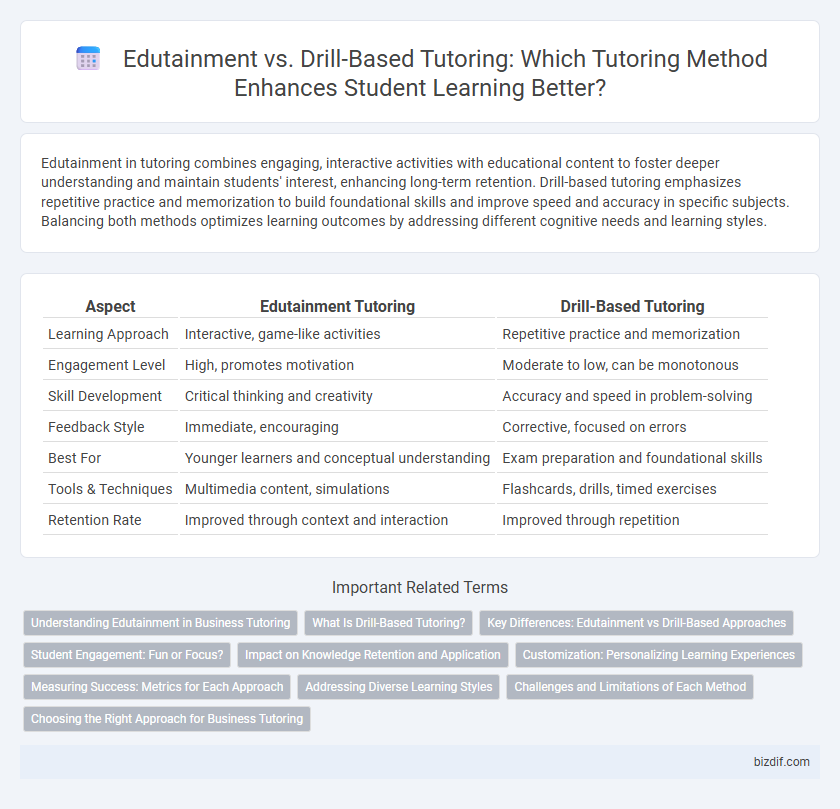Edutainment in tutoring combines engaging, interactive activities with educational content to foster deeper understanding and maintain students' interest, enhancing long-term retention. Drill-based tutoring emphasizes repetitive practice and memorization to build foundational skills and improve speed and accuracy in specific subjects. Balancing both methods optimizes learning outcomes by addressing different cognitive needs and learning styles.
Table of Comparison
| Aspect | Edutainment Tutoring | Drill-Based Tutoring |
|---|---|---|
| Learning Approach | Interactive, game-like activities | Repetitive practice and memorization |
| Engagement Level | High, promotes motivation | Moderate to low, can be monotonous |
| Skill Development | Critical thinking and creativity | Accuracy and speed in problem-solving |
| Feedback Style | Immediate, encouraging | Corrective, focused on errors |
| Best For | Younger learners and conceptual understanding | Exam preparation and foundational skills |
| Tools & Techniques | Multimedia content, simulations | Flashcards, drills, timed exercises |
| Retention Rate | Improved through context and interaction | Improved through repetition |
Understanding Edutainment in Business Tutoring
Edutainment in business tutoring combines educational content with engaging multimedia tools to enhance comprehension and retention of complex business concepts. This approach leverages interactive simulations and real-world case studies, making learning more dynamic compared to traditional drill-based methods that emphasize repetitive practice and memorization. By fostering critical thinking and creativity, edutainment methods improve learners' ability to apply strategic business skills in practical scenarios.
What Is Drill-Based Tutoring?
Drill-based tutoring is a focused instructional method that emphasizes repetition and practice of specific skills to reinforce learning and improve retention. This approach often targets foundational subjects like math facts or vocabulary through structured exercises and frequent assessment. By systematically drilling core concepts, students develop automaticity and mastery essential for academic progress.
Key Differences: Edutainment vs Drill-Based Approaches
Edutainment tutoring integrates educational content with engaging multimedia and interactive activities to enhance student motivation and improve retention through enjoyable learning experiences. Drill-based tutoring emphasizes repetitive practice and memorization of concepts to build mastery and accelerate recall, often using structured exercises and frequent assessments. The key differences lie in engagement methods and learning objectives, with edutainment fostering conceptual understanding and creativity, while drill-based approaches prioritize accuracy and speed in skill acquisition.
Student Engagement: Fun or Focus?
Edutainment in tutoring boosts student engagement by blending learning with enjoyable activities, making concepts easier to grasp and retaining attention longer. Drill-based tutoring emphasizes repetition and practice, enhancing focus and mastery through structured exercises that reinforce skills. Balancing fun and focus depends on individual learning styles, where interactive content sparks motivation and drills solidify knowledge retention.
Impact on Knowledge Retention and Application
Edutainment tutoring enhances knowledge retention by combining engaging multimedia and interactive activities that stimulate multiple learning pathways, making information more memorable. Drill-based tutoring reinforces foundational skills through repetition and practice, promoting procedural fluency but often lacks contextual application, limiting deeper understanding. Studies show that while drill-based methods improve short-term recall, edutainment approaches significantly boost long-term knowledge application and critical thinking abilities.
Customization: Personalizing Learning Experiences
Edutainment tutoring leverages interactive multimedia and gamified content to tailor lessons according to individual learning styles and interests, enhancing engagement and retention. Drill-based tutoring emphasizes repetitive practice customized to address specific skill gaps and mastery levels, ensuring targeted improvement through adaptive exercises. Both approaches use data-driven insights to personalize learning pathways, optimizing student progress and motivation.
Measuring Success: Metrics for Each Approach
Edutainment tutoring success is often measured by student engagement levels, retention rates, and improvements in conceptual understanding, utilizing metrics like interactive participation scores and long-term knowledge application. Drill-based tutoring commonly relies on quantitative metrics such as accuracy, speed of problem-solving, and mastery of specific skills through repeated practice, often monitored via standardized test scores and error reduction rates. Comparing these approaches requires analyzing both cognitive gains and motivational factors to identify which method best enhances learning outcomes for diverse student needs.
Addressing Diverse Learning Styles
Edutainment tutoring integrates interactive multimedia and gamified content, effectively engaging auditory, visual, and kinesthetic learners by making educational experiences more immersive. Drill-based tutoring emphasizes repetitive practice and memorization, benefiting learners who excel through structured reinforcement and pattern recognition. Combining both approaches addresses diverse learning styles, promoting comprehensive understanding and skill retention across varied student preferences.
Challenges and Limitations of Each Method
Edutainment tutoring often struggles with maintaining academic rigor while keeping lessons engaging, potentially leading to gaps in foundational knowledge. Drill-based tutoring, though effective in reinforcing core skills through repetition, can cause student burnout and reduce motivation due to its monotonous nature. Both methods face challenges in balancing engagement with effective learning outcomes, requiring careful adaptation to individual student needs.
Choosing the Right Approach for Business Tutoring
Edutainment in business tutoring leverages interactive multimedia and gamified lessons to enhance engagement and retention, making complex concepts more accessible. Drill-based tutoring, focusing on repetitive practice and mastery of specific skills, ensures precision and consistency essential for professional development. Selecting the right approach depends on learner goals, with edutainment fostering creativity and conceptual understanding, while drill-based methods build accuracy and routine expertise crucial for business success.
Edutainment vs Drill-Based Tutoring Infographic

 bizdif.com
bizdif.com